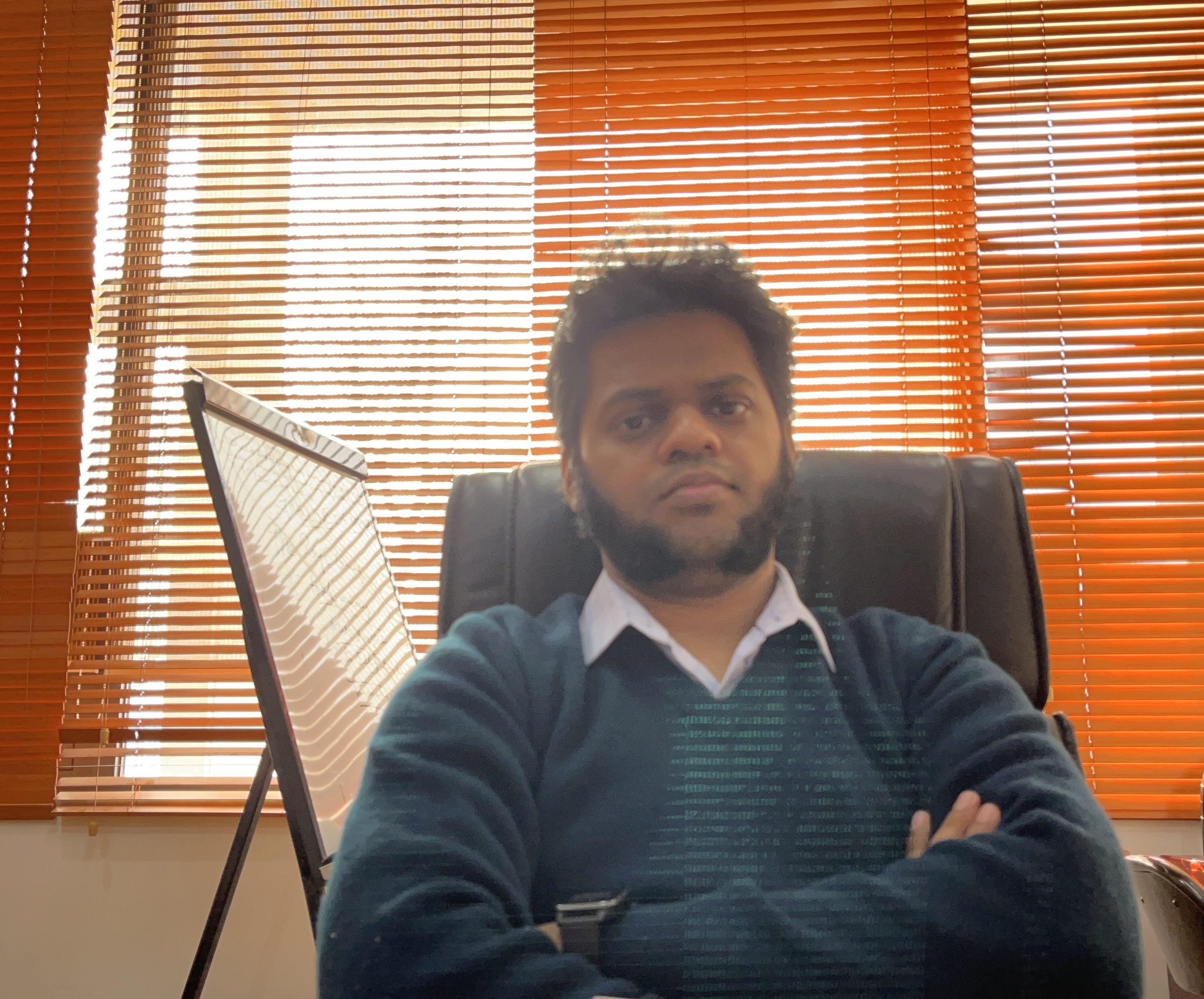Vivekanand Selvaraj talks process, society, his poetic origins, and writing in both Tamil and English.

Deva Eveland: I thought these poems had something machine-like not only in their content, but how they’re laid out. Today as I re-read them, I read them aloud and unconsciously started talking in an almost robotic voice. I wondered if this quality was purposeful?
Vivekanand Selvaraj: This set of poems is completely unlike what I usually write. Typically, I’d have a lot of pop culture references in my poems. And I’m a Tamil speaker, so a lot of references connected to my cultural linguistic identity as well. But when I set out to write these down, I thought of writing something that could have been written by almost anybody else anywhere in the world. I initially titled them the Machine Poems. So when I wrote, I thought there had to be something of the structure of a machine. But I really did want to look at it from the point of view of a cog, more than the machine. The single piece in the machine. So, I think it intuitively came together like a machine kind of thing.
DE: How did you arrive at 10 poems?
VS: When I wrote them originally, I didn’t set out to write a series of 10 poems. I just wrote what came to my mind. I think 10 is a round number. You’re creating a machine of your own by doing that. I realized after I’d done four poems, this looks cool. Maybe I want to do 25 poems, 45 poems? When that sort of thought kicks in, I try to avoid it. I don’t want to get into that. So, I stopped with ten.
DE: Did you write them in a short space of time or over a long period?
VS: I think I wrote all of them in a week’s time. I wrote one, then I wrote number two on the same day. Everything I thought of, in those days, got distilled into these poems, but I didn’t realize it looked like a machine at that time. I think I stumbled upon the form. I knew I didn’t want to go into long, complicated sentences. I just wanted it to sound like a 0 1 0 1 sort of thing. And then once I wrote the first two, everything else came together in that form.
DE: You describe them as comprising a “mise-en-scene act.” Could you talk more about what you mean by that?
VS: If I’m not wrong, mise-en-scene is originally a theatre or a movie thing, where say you have a room, and in that room you have different objects that tell the viewer a lot of things outside of the content or plot. So, you have the full layout of the room and you can make your own meanings out of it. We have always looked at the machine from the outside. Instead, what if I went inside it? Get a snapshot of the machine at any point, and then start with this. Then I thought it was like a planet of cogs. I really didn’t want to make it like an anti-machine poem. I also wanted to see how the cogs derive something out of the machine. The cogs also do take pleasure in their cogness.
DE: A symbiotic relationship.
VS: A symbiotic relationship. Some of which is derived from a certain delusion which makes you feel good about being a cog. Also, that the machine could not have come into being in the first place without the cogs somehow conspiring and falling into their slots.
DE: If it’s not rude to ask, do you think of yourself as a cog?
VS: I think all of us are. I think all organizations, any type of organization creates a certain structure. Even those organizations that propose to be very open still have to have a certain structure. Even art organizations, Spittoon for example. Any organization that proposes to achieve a certain objective. The machine might be loose, tense. I still think it has a certain structure.
DE: Speaking of structure, how do you know when a poem is finished?
VS: I kind of think that when you’re inside the flow, you just know. When I reach a certain line, I realize I’ve said everything I need to say. If I do more, I’m just trying to be smart. So, you know when that point comes, and you stop it right here.
DE: How did you come to poetry? Did you study it formally? Did you grow up in a literary family?
VS: I didn’t have a formal training. I wouldn’t say my father was really interested in poetry, but he was a school teacher, so he did have a lot of books. He placed a lot of value on reading, so I did read a lot. There was a time when I did start writing poems and my class teacher said they were nice. They were doggerels. I wrote in my mother tongue, Tamil. When I wrote them, at the time I thought, “this is poetry.” Everyone encouraged me. I kept writing these doggerels until college. Then one day, by mere happenstance, I bought a magazine—a proper, serious literature magazine. I read a poem in it and I confronted that poem with all of my arrogance. I didn’t understand a word of it even though I knew the meaning of all the words. These words go together and they sound nice, but what do they even mean? Every poem in that magazine was like algebra, and I couldn’t get it. Then I became fascinated by modern poetry which had rid itself of rhyme, form, all those things. I started trying to write like that. It was a process that I went through the entire time I was going to medical school. It was medical science by day, and poetry by night. It went on and on, and at some point in time I switched to English because the people who were reading whatever I was writing didn’t know Tamil. The people who wanted to read literature did not speak my language, so I had to translate it for them.
DE: Have you stayed writing in English since? Or have you gone back and written in Tamil as well?
VS: I never stopped writing in Tamil. My debut collection of poems came out in Tamil last year. So actually, I ended up publishing in Tamil first. But 60-70% of the poems in it were first written in English and then translated into Tamil. Ironically, people keep telling me that they wish they knew Tamil so that they could read the original. But right now, English is the original language of my poems, more often than not. I know it’s weird. I’m also working on my English anthology and probably it’s coming out this year.


Vivekanand Selvaraj writes in both English and Tamil and translates from Chinese and English to Tamil and also from Tamil to English. His work has appeared in The Bombay Literary Magazine, Nether Quarterly (Revival issue), Bengaluru Review, Poetry at Sangam, Sonic Boom, Vayavya and The Freedom Review. His debut collection of Tamil poems, Sudhandhiram Oru Dabba was released in January 2021 (Manalveedu Publishers). He is also an amateur theatre enthusiast, having written and staged quite a few of them. He is a diplomat currently stationed at Beijing.
